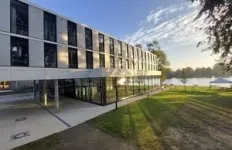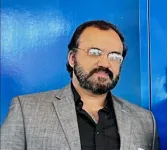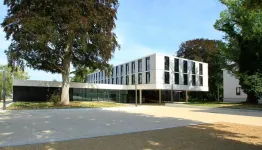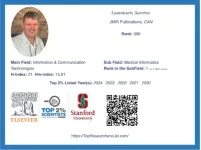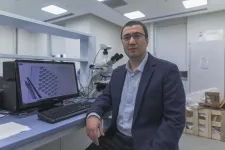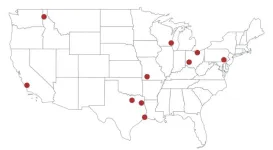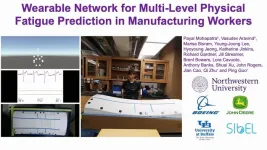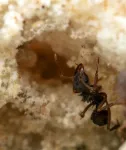“These new grants emphasize SU2C’s support of collaborative, trailblazing research that pushes the field forward and helps people impacted by some of the most common or difficult-to-treat cancers,” said Julian Adams, Ph.D., president and CEO of SU2C. “With an emphasis on answering critical questions about how to tailor and personalize targeted cancer treatments, these projects have the potential to increase survival with less side effects.”
Below are the recently funded SU2C grants.
SU2C-Cancer Research UK Pediatric Cancer New Discoveries Challenge: Two trans-Atlantic teams are receiving second-round funding for research focused on cancers that impact children and young people. One team is working to reduce the side effects of our current brain tumor treatments by studying exactly what they do to children's and young people’s brains; this team is led by Martin McCabe, MB/BChir, Ph.D. from the University of Manchester and co-led by Thomas E. Merchant, D.O., Ph.D., from St. Jude Children’s Research Hospital. The other team is finding and testing specific immunotherapy combinations – including CAR-T therapy and immunotherapy drugs – to treat the brain tumour medulloblastoma and the nerve cell cancer neuroblastoma; this team is led by John Anderson, MBBS, Ph.D., from the University College London Great Ormond Street Institute of Child Health, and co-led by Louis Chesler, M.D., Ph.D., from The Institute of Cancer Research and Paul M. Sondel, M.D., Ph.D., from the University of Wisconsin Carbone Cancer Center. SU2C Catalyst® Research Grant With Support From Zentalis Pharmaceuticals: This team – funded by a 2022 contribution from Zentalis Pharmaceuticals – will study a drug called azenosertib, which targets abnormal cell division and may help in treating the growing number of head and neck cancers caused by the human papilloma virus (HPV). There is a pressing need for treatments tailored to the unique biology of these tumors, which behave somewhat differently from other head and neck cancers. Despite their distinct biology, patients with these cancers largely receive the same highly toxic therapies. Many develop the disease at a relatively young age and are cured but can experience severe and lasting disabilities from therapy, underscoring a need for more targeted approaches. In addition, some patients relapse with poor outcomes after standard treatment and need new approaches that take advantage of the vulnerabilities of these tumors with targeted agents such as azenosertib, which is developed by Zentalis. The team is led by Bruce Clurman, M.D., Ph.D., from Fred Hutch Cancer Center, and co-led by Devraj Basu, M.D., Ph.D., from the University of Pennsylvania. 2024 SU2C Ziskin Prize: This team will create organoids – small, simplified, three-dimensional tumors grown in a lab – of triple negative breast cancer and then will treat the organoids with different combinations of targeted therapies. The goal of this work is to identify specific characteristics of triple negative breast cancer to develop personalized treatment strategies for people with this cancer type, which is particularly difficult to treat. The team is led by Marilyne Labrie, Ph.D., from the Université de Sherbrooke in Canada, and co-led by Funda Meric-Bernstam, M.D., from the University of Texas MD Anderson Cancer Center. The Ziskin Prize honors legendary Hollywood producer and SU2C co-founder Laura Ziskin, who passed from breast cancer in 2011. Three 2024 SU2C Innovation in Collaboration Awards were granted during the annual SU2C Scientific Summit earlier this year. These awards include two collaborators from the SU2C scientific community, including scientific leaders, senior researchers, and early career investigators. The hallmark of these awards is their ability to quickly spark the “aha” moments; ideas are submitted, reviewed and awarded at the summit.
Nina Nicolai Innovation in Collaboration Award: This research will focus on how pancreatic cancer responds to drugs that target a specific genetic mutation called KRAS, which occurs often in this type of cancer. Findings from this project will provide insight into how common immunotherapy drugs should be paired with KRAS inhibitors for people with pancreatic cancer, one of the deadliest cancer types. Led by William Freed-Pastor, M.D., Ph.D., from Dana-Farber Cancer Institute, and co-led by Steven Carr, Ph.D., from Broad Institute of MIT and Harvard, this newly created award is named after Nina Nicolai. In her passing, Nicolai left a legacy of support for Chicago White Sox Charities, which has collaborated with SU2C to create this award to make an impact for people experiencing late-stage cancer diagnosis. Cless Family Gastric Cancer Innovation in Collaboration Award: A project focusing on a particularly difficult-to-treat type of gastro-esophageal cancer will utilize artificial intelligence to analyze samples from patients who have received certain treatments for this cancer type, and will leverage the use of esophageal tumor organoids, to advance the understanding of gastro-esophageal cancer and determine better treatment strategies. This research, which is supported by the Cless Family Foundation, is co-led by Karuna Ganesh, M.D., Ph.D., from Memorial Sloan Kettering Cancer Center and Christina Curtis, Ph.D., from Stanford University. Phillip A. Sharp Innovation in Collaboration Award: This research will broaden understanding of how the microbiome communicates with the immune system, with potential impact on the field of immunotherapy. This research is co-led by Shawn Davidson, Ph.D., from Northwestern University Feinberg School of Medicine and Ami Bhatt, M.D., Ph.D., from Stanford University.
# # #
Media Contacts:
Mirabai Vogt-James Paul Panday
Stand Up To Cancer Stand Up To Cancer
mjames@su2c.org ppanday@su2c.org
About Stand Up To Cancer
Stand Up To Cancer® (SU2C) raises funds to accelerate the pace of research to get new therapies to patients quickly and save lives now. SU2C is a 501(c)(3) charitable organization and was initially launched as a division of the Entertainment Industry Foundation. Established in 2008 by media and entertainment leaders, SU2C utilizes these communities’ resources to engage the public in supporting a new, collaborative model of cancer research, to increase awareness about cancer prevention, and to highlight progress being made in the fight against the disease. As of April 2024, more than 3,100 scientists representing more than 210 institutions are involved in SU2C-funded research projects.
As SU2C’s scientific partner, the American Association for Cancer Research (AACR) and a Scientific Advisory Committee, led by William G. Nelson, M.D., Ph.D., conduct rigorous competitive review processes to identify the best research proposals to recommend for funding, oversee grants administration, and provide expert review of research progress.
Current members of the SU2C Founders and Advisors Committee (FAC) include Katie Couric, Sherry Lansing, Kathleen Lobb, Lisa Paulsen, Rusty Robertson, Sue Schwartz, Pamela Oas Williams, and Ellen Ziffren. The late Laura Ziskin and the late Noreen Fraser are also co-founders. Julian Adams, Ph.D., serves as SU2C’s president and CEO.
For more information, visit StandUpToCancer.org, Instagram, TikTok, Twitter, Facebook, and YouTube.
END

